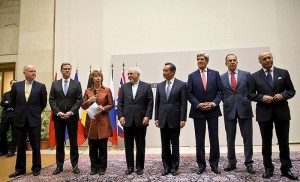 Dec 3 (Reuters) - It was a flourishing packing�business�in Iran's historic city of Isfahan, but the last two years of harsh economic sanctions brought the family enterprise to its knees.
Dec 3 (Reuters) - It was a flourishing packing�business�in Iran's historic city of Isfahan, but the last two years of harsh economic sanctions brought the family enterprise to its knees.Owner Gholam Dolatmardian struggled to raise the funds to keep going but finally succumbed to the inevitable, laying off his 100-strong workforce and closing the doors of the once prosperous factory.
The prospects for a revival of his�business�and those of thousands of others may depend on an interim nuclear accord reached between�Iran�and world powers last week. The deal has allowed those Iranians seeking greater foreign contact and the economic opportunities it brings to see a glimmer of hope for the first time in years.
But Iranians' enthusiasm about the accord has been tempered by its complexity and expected gradual implementation, which puts off relief from restrictions on banking, trade and international travel that ordinary Iranians seek most.
After a decade-long standoff,�Iran�has agreed to curb elements of its nuclear activities in exchange for limited relief from economic sanctions imposed by the United States and its allies, opening the way for a possible broader agreement that could end Iran's long isolation.
"I don't know whether the sanctions will be lifted soon, but of course it is my dream to reopen my factory," Dolatmardian said by phone. "It was a family business and I want my children to continue it."
He inherited the factory from his father, like his father before him. But he closed it in 2011, when sanctions prevented him from obtaining letters of credit or wiring money to European suppliers. He sold off properties to pay his employees before eventually shuttering the 35-year-old factory.
Last week's diplomatic breakthrough led him to wonder about restarting the business, but for now he faces the same obstacles of accessing the global banking system.
U.S. anti-money laundering legislation is still in place, making it difficult for�banks�that have any U.S. business to maintain ties with�Iran. As a result, Iranian firms will continue to find it difficult to obtain letters of credit or conduct international bank transfers.
So while Iranian businessmen may sense a lucrative investment opportunity around the corner, many are still taking a wait-and-see approach.
Ahmad Hakimzadeh, who runs an import-export company in the northwestern city of Tabriz, said he has already received calls from Western companies about resuming business relations which they had broken off under pressure from sanctions.
He said he cannot make any plans with his foreign partners while financing restrictions remain in place, but he knows there would be demand the moment the curbs are lifted.
OPEN TO THE WORLD
Nevertheless, after eight years of growing isolation, the election of moderate President Hassan Rouhani and the nuclear accord are allowing many Iranians to contemplate a future free of such restrictions and the economic challenges they produce.
Thousands of Iranians studying abroad are hoping the agreement will help them pay their education bills, buoyed by the deal's promise of $400 million in governmental tuition assistance for students at foreign universities.
The Iranian rial, devalued by sanctions, has increased the cost of living abroad more than three-fold since 2011, and curbs on Iranian�banks�have made it nearly impossible for families to transfer money to pay their children's tuition. Students must often carry thousands of dollars out of Iran.
But the deal's vague terminology and slow implementation leave students only to hope that the relief will reach them.
"If they allow families to transfer and wire money from Iran, that could be great because we have so many problems with transferring money," said Misagh Heidari, who is pursuing his master's degree at California State University, Northridge.
"But if it's about government tuition assistance, we do have government scholarships but they're so limited," he said.
U.S. Treasury spokesman John Sullivan told Reuters payments would come "from Iran's restricted oil revenue held outside of the country," without providing detail about their disbursal.
Abbas Araqchi, Iran's deputy foreign minister, confirmed the size and source of the tuition aid.
"It was agreed to pay university and college fees directly for Iranians studying abroad for a period of six months," he was quoted as saying by state news agency IRNA. But it is not clear which students and institutions the measure will benefit.
Ahmad, who studies in Belgium, said money earmarked for tuition assistance "does not make any sense to me or my friends. We don't know who is the target group."
Students and others are also hoping the detente between Iran and the West will make it easier to travel internationally. The deal includes no easing on visa restrictions or direct flights, but Iranians expect reintegration into the world community will yield improvements.
Mahboubeh Zare's children have not returned to Iran since moving to the United States nearly a decade ago. The 63-year-old from the southern port city of Bandar Abbas said she hopes now it will be easier to see her children.
"My son wants to come and visit me this summer," she said. "This deal is bringing back my children to their homeland."
By Reuters
The Iran Project is not responsible for the content of quoted articles.










